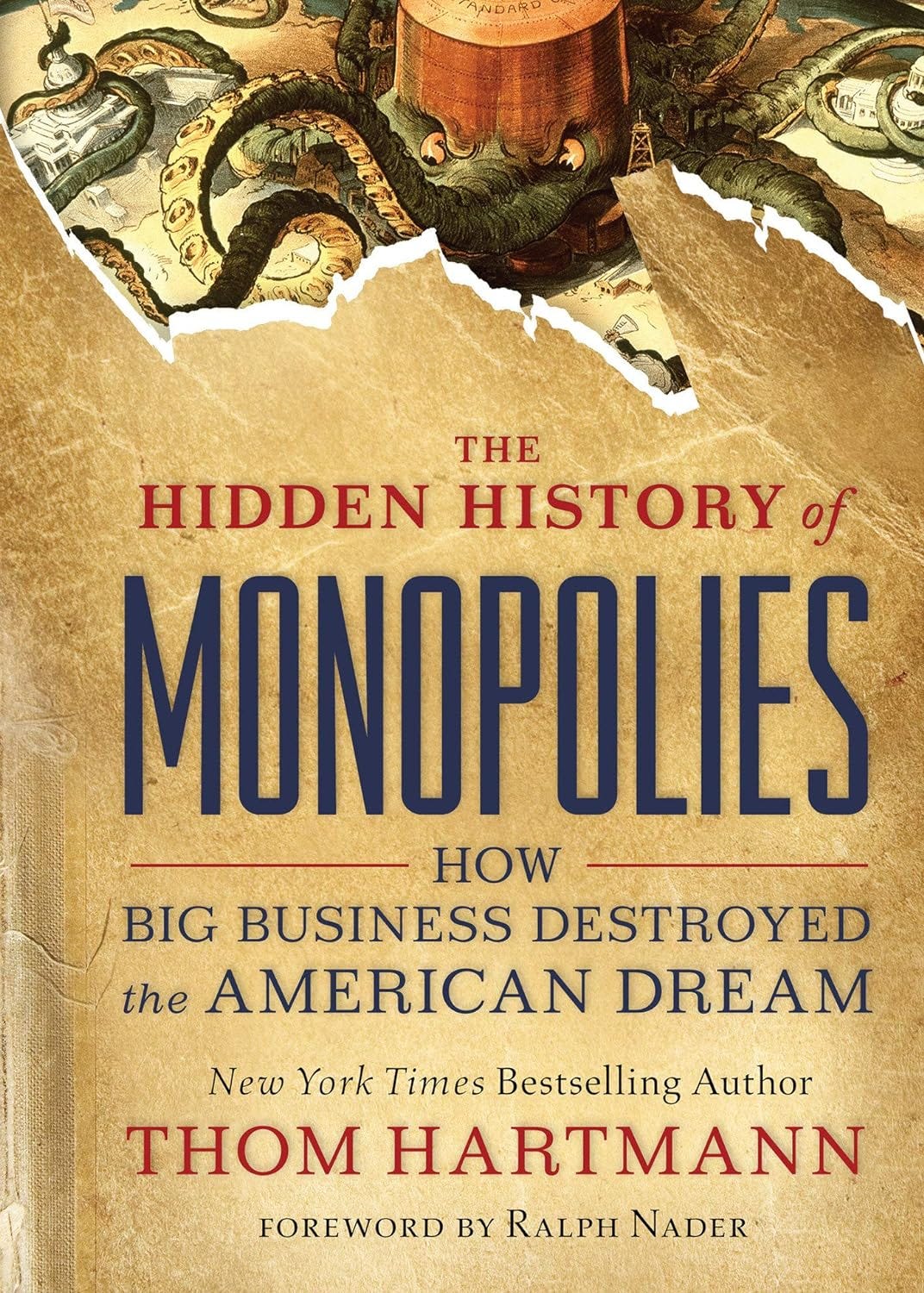Solution: Break Up the Internet Giants
Your weekly excerpt from one of my books. This week: "The Hidden History of Monopolies: How Big Business Destroyed the American Dream"

Solution: Break Up the Internet Giants
I was oblivious to the real significance of Facebook in everyday life until the company disabled my personal, private account. The list of possible reasons they posted for doing this included “impersonating a celebrity,” so maybe they shut me down because they thought I was pretending to be that guy who’s a talk show host and author (ahem).
It’s also possible that somebody at Facebook took offense to my interviewing Judd Legum around that time about the groundbreaking research he’s been publishing over at popular.info pointing out the right-wing, pro-Trump slant that Facebook’s corporate management and founder took in 2019.61 Fact is, though, I have no idea why they did it, although my account spontaneously reappeared a few weeks after an earlier version of this chapter appeared as an article on Salon.com and other sites.
When they first disabled my account and asked me to upload my driver’s license (which I did at least seven times over several weeks), I figured it was a mistake. Then, a month or two later, they delivered the final verdict: I was out. I could download all my information if I wanted before they finally closed the door, but even when I tried to create a new account using my personal email address, they blocked my attempt, saying that I already had a (disabled) account and thus couldn’t create another.
I checked Facebook only once a week on average, and only followed close friends and my widely scattered relatives, having configured my personal account to be as private as possible. I figured I could do without knowing what my cousins’ kids, or my nieces and nephews, were up to; I could just call them or send them Christmas cards, after all. And the Salem International private group of international relief workers I was a member of could keep me up to date through our email listserv.62
What I discovered in the weeks after I was dumped by Facebook, particularly when one of my Salem friends in Germany was badly injured in a car accident, was that I was shockingly reliant on Facebook to keep in touch with family and friends. As the Joni Mitchell song goes, you don’t know what you’ve got till it’s gone.
Which raises the question, has Facebook gone from being merely a destination on the internet to being so interwoven in our lives that it should now be considered part of the commons and regulated as such?
Is it time to discuss taking Facebook out of private, for- profit hands?
Or, alternatively, is it time for the federal government to break up Facebook or even create a national town square, an everyperson’s civic center, to compete with it?
The history of Europe and the United States, particularly throughout the 19th century, often tells the story of how wealthy and powerful men would congregate in exclusive members-only men’s clubs to determine the fate and future of governments, businesses, and even local communities.63 You’ll find them woven into much of the literature of that era, from Dickens to Doyle to Poe.
Because these clubs had strict membership requirements, they were often at the core of governmental and business power systems, helping maintain wealthy white male domination of society. The rules for both initial and continuing membership were typically developed and maintained by majority or even consensus agreement of their members, although the homogeneity of that membership pretty much ensured that women, men of color, and men of lower social or economic status never had a say in public or private institutional governance.
Then, at the cusp of the 20th century, things changed.
The first decade and a half of the 20th century saw an explo- sion of progressive reforms, best remembered as the time when progressive Republican presidents Theodore Roosevelt and William Howard Taft (who followed him) engaged in massive trust-busting, breaking up America’s biggest monopolies to make room for local, small, and medium-sized businesses to grow.64
An often-overlooked phenomenon during that era was the creation of egalitarian, public civic centers across the country, usually built and owned by local or regional governments. While to this day men’s clubs remain places where the brokers of great power and wealth can congregate, these new publicly owned civic centers replaced the much smaller and less comfortable public parks and private pubs as places where average citizens could socialize, strategize, and form political movements at no cost.
Progressive political movements like the suffragists used these public squares heavily, and they became an essential building block of movement politics (along with public schools—many states passed laws authorizing their auditoriums to be used as civic centers).65
Public dialogues and even local or regional discussions about local and national politics have moved from the men’s clubs (1700–1900) to the civic centers (1901–1990s). Today they are held on the internet, another public space that was created by the US government (DARPA) and universities.
Facebook, however, figured out a way to privatize a large part of that public space and turn it into cash, making Mark Zuckerberg, at $77.8 billion, the eighth-richest person in the world.66
While Facebook was, in 2019 and 2020, embroiled in a controversy over whether it was wrong for it to allow Trump’s political advertising that contained naked lies, the debate over fully or partially nationalizing the platform, or breaking up the company, has gotten much less coverage.
But it’s an important issue and deserves more attention. Facebook was so critical to Donald Trump’s 2016 election efforts, for example, that his 2016 digital media/Facebook manager, Brad Parscale, was elevated to managing the entire Trump 2020 effort—again, with Facebook at the center of it.


